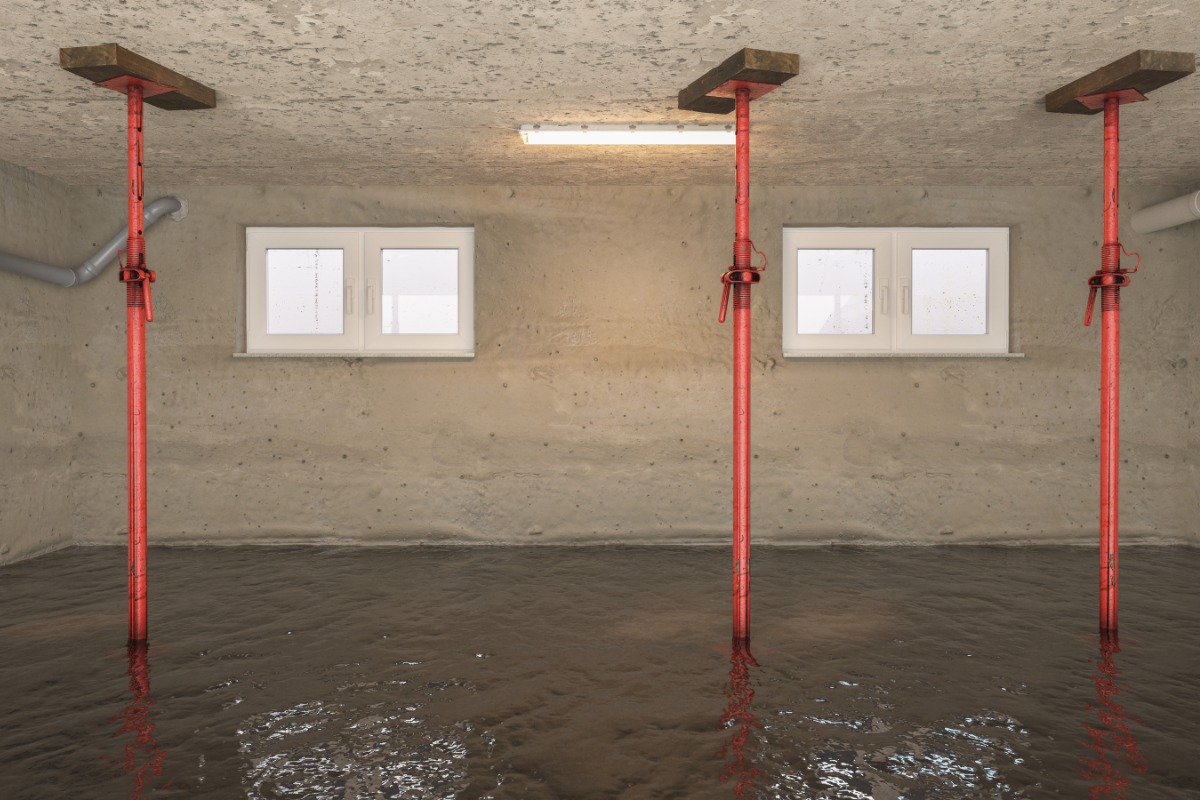
How To Deal With Basement Flooding Due To Rain: Solutions And Preventive Steps
By: 911 Water Damage Experts
Introduction
Unwanted basement flooding is a homeowner’s nightmare, and even moderate rain can lead to water entering your home.
Spring showers, while beneficial for gardens, can cause havoc when they find their way into your basement.
This article offers guidance on what to do if your basement floods due to rain, providing practical steps to mitigate the damage and prevent future occurrences.
Let’s get right into it.
Understanding Basement Floods Caused By Rain
Rain-related basement floods often stem from various sources, including the pressure exerted by water-saturated soil around your foundation. The following factors contribute to this issue:
Hydrostatic Pressure:
Prolonged rain saturates the soil, creating hydrostatic pressure that forces moisture through basement walls and floors.
Lateral Pressure:
Loose soil near the foundation can expand with rainwater, exerting sideways pressure against the foundation and causing leaks.
Window Wells:
Improperly installed window wells can accumulate rainwater, which then seeps into the basement.
Cracks in walls and floors worsen the problem, leading to wall stains and pooling water that signals a leaky basement.
Steps to Take If Your Basement Floods:
-
Contact Local Authorities:
Get in touch with your city’s water department to learn about your home’s sewer condition and understand the drainage system.
-
Exercise Caution and Clean Safely:
Wear protective gear like eye protection, gloves, and boots to avoid contamination. Avoid tracking floodwater to other parts of your home.
-
Mop Up and Dry:
Thoroughly clean the flooded areas. Use a solution of eight tablespoons of liquid chlorine bleach mixed with a gallon of water to disinfect surfaces.
-
Dispose of Contaminated Items:
Safely discard items that came in contact with floodwater. Document them with photographs for insurance claims.
-
Remove Damaged Drywall:
Mold growth can be prevented by removing flooded drywall within 24 hours of flooding.
-
Seek Professional Help:
Contact water damage professionals or plumbers to assess and repair the damage. They can also offer advice on preventive measures.
-
Stay Proactive:
Don’t wait for an emergency. Review your homeowner’s insurance policy annually and consult your insurance company about coverage options.
-
Consider Waterproofing Solutions:
Installing an interior drainage system with a sump pump is a reliable solution. This drain tile along the foundation joint helps minimize hydrostatic pressure.
Tips On How To Prevent Basement Floods
-
Maintain Gutters and Downspouts:
Regularly clean and maintain your gutters and downspouts to ensure rainwater is directed away from your foundation. Clogged gutters can lead to water overflow and potential basement leaks.
-
Install Downspout Extensions:
Extend your downspouts to discharge water at least six feet away from your foundation. This prevents excess water from pooling near your home’s perimeter.
-
Proper Grading Around the Foundation:
Ensure the ground around your foundation slopes away from your home. This prevents water from accumulating near the foundation, reducing the risk of seepage.
-
Seal Cracks and Openings:
Regularly inspect your foundation for cracks and openings. Seal any gaps with waterproof sealant to prevent water infiltration during heavy rains.
-
Install Window Well Covers:
If your basement has windows with window wells, install covers to prevent rainwater accumulation and debris from entering. This helps keep your basement dry and reduces the risk of leaks.
-
Maintain Sump Pump:
If you have a sump pump, ensure it’s in proper working condition. Regularly test it and consider installing a battery backup system to keep it operational during power outages.
-
Elevate Electrical Systems:
Keep electrical systems and appliances elevated above potential flood levels. This prevents damage and minimizes the risk of electrical hazards during floods.
-
Install a Backflow Valve:
Install a backflow valve in your sewer line to prevent sewage backup during heavy rains. This valve ensures that water flows away from your home instead of into it.
-
Consider Exterior Waterproofing:
Invest in exterior waterproofing measures, such as applying waterproof coatings to your foundation walls. This creates an additional barrier against water infiltration.
-
Landscaping Considerations:
Plant native, water-absorbent vegetation around your home to help absorb excess rainwater. This natural barrier can reduce the risk of flooding.
-
Regular Maintenance of Water Drainage Systems:
Regularly inspect and maintain your water drainage systems, including French drains and perimeter drains. Clean them of debris to ensure proper functionality.
-
Install Water Alarms:
Place water detection alarms in your basement. These devices sound an alert if they sense rising water levels, giving you an early warning of potential flooding.
-
Store Valuables Wisely:
Keep valuable belongings on higher shelves or elevated platforms to protect them from potential flood damage.
-
Check Foundation Vents:
Ensure foundation vents are in good condition and not blocked. Proper ventilation can help prevent excess moisture buildup in your basement.
-
Regular Inspections:
Conduct regular inspections of your basement for signs of leaks, dampness, or moisture. Address any issues promptly to prevent them from escalating.
What Not To Do If Your Basement Floods?
-
Avoid Entering Areas with Sagging Ceilings:
Entering rooms with sagging ceilings is extremely hazardous. These ceilings could collapse due to the weight of accumulated water and damage, posing a significant risk to anyone inside.
-
Steer Clear of Plugged-in Electrical Items:
Avoid touching or using any electrical items that are plugged in within the flooded area. Water and electricity create a dangerous combination that can lead to electric shock or even fires.
-
Keep Electrical Appliances Away from Water:
Never store electrical appliances, including fans, near water, regardless of whether they are operational or not. Water can compromise their safety and increase the risk of electrical hazards.
-
. Refrain from Using Heat to Dry Interiors:
Using heat sources, such as heaters or hairdryers, to dry out flooded interiors is not recommended. This can worsen the situation by promoting mold growth and potentially causing further damage.
-
Prohibit Children and Pets from Flooded Areas:
For safety reasons, ensure that children and pets are kept away from any flooded areas. Floodwaters can carry contaminants and pose risks to their health and well-being.
Conclusion
Basement flooding due to rain can be distressing, but with the right knowledge and actions, you can minimize the damage and prevent future incidents. Being proactive by maintaining your home’s drainage systems, seeking professional help when needed, and investing in preventive measures like waterproofing systems can go a long way in safeguarding your home against rain-related flooding. By taking these steps, you can regain peace of mind even during the rainiest of seasons.
If you have any questions about our article, “How To Deal With Basement Flooding Due To Rain: Solutions And Preventive Steps” or need water damage restoration services feel free to call us at 1-833-WE-DRY-IT any time 24/7/365 or chat with us on LiveChat or social media.
Related Posts
Water Damage Restoration Articles
How to prevent home storm damage
What you can expect from a fire damage restoration company
Water damage prevention tips from the most common problems we’ve seen
Top causes of water damage in commercial buildings and how to find them
Must-know water damage tips: What to do after your house floods
What does good water damage restoration look like?
DIY water damage restoration and the hidden dangers
How to choose the right water damage company
Flast floods: What to do before, during and after a flash flood
What to do when your attic leaks?
Mould Removal Restoration Articles
5 Signs You Have Mould Growing In Your Walls
“Can I Remove Mould Myself?” Our Mould Removal Experts Have Answers
7 Must-Know Reasons Why You Should Get A Mould Inspection Before Buying A House
Does Mould Attract Bugs? Yes And Here’s What Kind And Why
How To Remove Mould From The Attic [Mould Prevention Tips Inside]
How Rain Causes Mould Growth-Prevention Tips Included
Must-Know Tips: How To Remove Mould In Your Basement
Fire Damage Restoration Articles
Fire prevention tips for the summer
How to clean up after a house fire
Fire damage restoration checklist
Fire damage tips: 6 hazards property owners miss
How smoke from fires can negatively affect your health
What are the most common causes of house fires?
10 helpful smoke damage cleaning tips
Related Water Damage Services
Fire damage restoration services
Water damage restoration services
Emergency cleanup services
Mould removal services
Weather damage services


